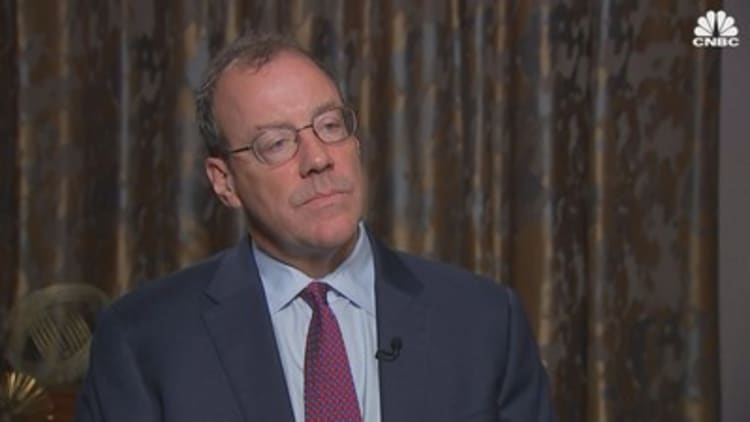Tobacco giant Altria said Thursday it has written down its $12.8 billion investment in troubled e-cigarette maker Juul by more than a third, recording a $4.5 billion pretax charge against its third-quarter earnings.
There wasn't a single event or factor that led to the write-down, Altria said. It cited the Trump administration's plans to remove flavored e-cigarettes from the market as well as e-cigarette bans by cities and states around the U.S. and by several countries.
Altria in its evaluation considered a number of possibilities and estimated how they might affect Juul's sales, Altria CEO Howard Willard told analysts on a call reviewing third-quarter earnings results Thursday. These are simply estimates and could always change, possibly leading to another write-down.
"Of course we're not pleased to have to take an impairment charge on the Juul investment," Willard said. "Certainly in the range of scenarios when we made our investment in Juul, we did not anticipate this dramatic of a change in the e-vapor category."
He said Altria "certainly" did not anticipate the outbreak of vaping-related lung disease and "dramatic" regulatory changes. Regulators are considering removing flavored e-cigarettes from the market pending reviews of their safety and whether they appeal to youth. Companies are required, in the meanwhile, to submit applications to the Food and Drug Administration by May to keep their products on store shelves, two years earlier than anticipated.
"The e-vapor category faces a critical inflection point," Willard said. He said efforts to raise the smoking age to 21 and remove flavors from the market could "reset the course" for the category.
Altria's $12.8 billion investment bought a 35% stake in Juul late last year, valuing the e-cigarette start-up at $38 billion. The deal is still awaiting regulatory approval. Altria said it expects a decision from the Federal Trade Commission in the first quarter of 2020.
"Despite the impairment charge, we remain committed to Juul's success," Willard said, noting that Altria estimates of 12.6 million adults who used e-cigarettes in September, up from 10.3 million a year earlier.
The write-down drove the company's net income down by about $2.41 a share. On an unadjusted basis, Altria booked a $2.6 billion loss for the quarter, or a loss of $1.39 a share, compared with a profit of $1.94 billion, or $1.03 a share, during the same time last year.
On an adjusted basis, which excludes one-time charges like the Juul write-down, the company's earnings for the three months ended Sept. 30 was $1.19 per share, beating estimates of $1.15 a share.
Altria's stock slipped 2.5% Thursday, closing at $44.80.
Here's what the company reported compared with what Wall Street was expecting, based on a survey of analysts by Refinitiv:
- Earnings per share: $1.19, adjusted, vs. $1.15 expected
- Revenue: $5.41 billion vs. $5.34 billion expected
In the nearly year since announcing the Altria deal, Juul has been embroiled in controversy. The company is largely blamed for fueling an epidemic of teen vaping.
Juul is the subject of numerous lawsuits claiming the company misled minors and addicted them to nicotine, as well as federal investigations into the company's marketing practices. A former Juul executive filed a wrongful termination lawsuit on Tuesday claiming the company's quest for profit trumped public health concerns.
Consumers are questioning the safety of e-cigarettes amid an outbreak of a mysterious vaping-related lung injury. The illnesses appear to be related to THC, though a number of patients have reported only vaping nicotine, the addictive chemical in Juul and other e-cigarettes.
The Trump administration is readying a plan that officials said would remove all flavored e-cigarettes from the market until — and if — the FDA reviews and authorizes them for public sale. Juul earlier this month announced it would stop selling most flavors of its nicotine pods.
Some, including former FDA Commissioner David Kessler, doubt the agency will clear Juul's application to keep selling its e-cigarettes, given rampant youth use of the products. A court ruling moved the application deadline to May 2020 from 2022. Willard said this creates "a more challenging situation" for all e-cigarette companies.
However, he thinks it's "highly likely" the FDA will allow Juul's products to stay on the market because Juul is investing "significant" resources to its application and its product can convert adult cigarrette smokers to vapers.
Longtime Altria executive K.C. Crosthwaite replaced Kevin Burns as CEO of Juul last month. Crosthwaite is shaking up top management, cutting jobs and trying to repair Juul's image. The company announced plans to suspend all product advertising in the U.S. and end its support of a campaign to overturn a San Francisco ordinance that banned the sales of e-cigarettes.
Altria is launching Iqos in the U.S. The device, which Altria is licensing from Philip Morris International, heats tobacco and is thought to produce fewer toxins than cigarettes. Altria introduced Iqos to Atlanta last month and will bring it to its hometown of Richmond, Virginia, next month.



